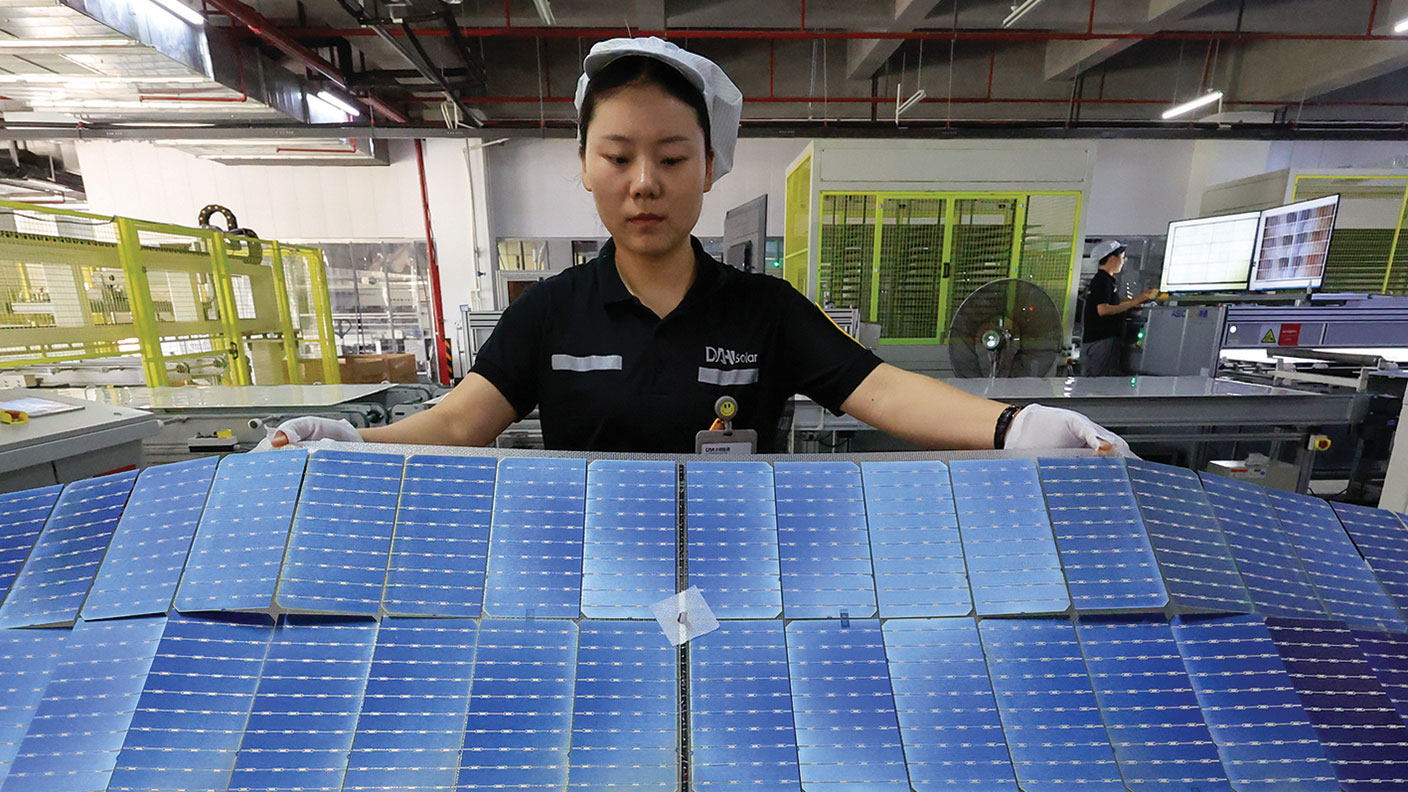The transition to renewable energy is easier said than done
We are on a path to “net zero” carbon emissions, says Edward Chancellor, but fossil fuels will be with us for some time yet.


Get the latest financial news, insights and expert analysis from our award-winning MoneyWeek team, to help you understand what really matters when it comes to your finances.
You are now subscribed
Your newsletter sign-up was successful
Want to add more newsletters?

Twice daily
MoneyWeek
Get the latest financial news, insights and expert analysis from our award-winning MoneyWeek team, to help you understand what really matters when it comes to your finances.

Four times a week
Look After My Bills
Sign up to our free money-saving newsletter, filled with the latest news and expert advice to help you find the best tips and deals for managing your bills. Start saving today!
Modern civilisation is built on fossil fuels. Oil, natural gas and coal still account for around 85% of the world’s primary energy inputs. While these represent a small fraction of reported global GDP, they support all other economic activities. Ending our dependence on hydrocarbons was always going to be a tough call. The ongoing process of deglobalisation makes it even harder.
In his new book, Grand Transitions, Canadian scientist Vaclav Smil describes how the modern carbon-based energy system supplies fuels for transportation, and inputs for what he calls the “four pillars” of our economy: iron, cement, plastics and ammonia. Currently there are no readily available mass-scale alternatives for the use of petrochemicals in feedstocks or fuel for bulk shipping and air travel. Despite growing concern over the risks posed by climate change, the use of fossil fuels has increased by around 20% since the turn of the century.
To date we have taken only tiny steps away from hydrocarbons. Electric vehicles accounted for 5% of global car sales last year. Wind and solar power still only account for a small share of electricity generation. If history is any guide, the transition is likely to be painfully slow. It took more than a century for crude oil, which was first extracted in the US, Canada and Russia in the 1850s, to overtake coal as the world’s largest energy source. “Large energy transitions,” writes Smil, “have always been gradual, prolonged affairs unfolding across generations, and the shift from carbon to non-carbon energies will be no exception.”
MoneyWeek
Subscribe to MoneyWeek today and get your first six magazine issues absolutely FREE

Sign up to Money Morning
Don't miss the latest investment and personal finances news, market analysis, plus money-saving tips with our free twice-daily newsletter
Don't miss the latest investment and personal finances news, market analysis, plus money-saving tips with our free twice-daily newsletter
Carbon emission targets are too ambitious
Nevertheless, governments around the world have committed to cutting carbon emissions in the coming decades. Smil doubts whether the timescale is feasible. Every historical transition has been facilitated by using the previously dominant fuel. Early British coal mines used timber for their pit shafts and props, while coal was transported from mines in wooden carts on wooden rails. In the 19th century, steel, produced with coke, was required to construct oil rigs and pipelines. Likewise, the transition to clean energy will require lots of fossil fuels – Chinese solar panels are made with electricity generated by coal. The trouble is that the oil market is in tight supply. As energy prices rise, the cost of investing in renewables is rising in tandem.
Thanks to recent technological advances, the price of electricity generated from renewables has reached parity with power from fossil fuels. Sometimes it’s cheaper. But ease of storage has always been a key factor in successful energy transitions. Currently there’s no cost-effective method of storing electricity produced by wind and solar, whose supply is intermittent. Owing to the vagaries of the weather, renewables in Europe operate at only 20% of potential capacity, according to Andy Lees of MacroStrategy. As the contribution from renewables increases, the intermittency of their supply is causing severe problems for electricity grids across the world.
Decarbonisation will spur demand for clean energy materials. We’ll need more lithium, nickel, cobalt and manganese for electric vehicles, vanadium for energy storage, silver and polysilicon for solar panels, iron and zinc for wind turbines, and copper for everything. But some of these materials are in short supply, and it’s not clear there are sufficient deposits of copper and nickel to meet projected demand. Lithium is a key material for electric cars. This element is not rare, but extraction is a messy business and new mines often face opposition. If Tesla reaches its projected demand for lithium-ion batteries in 2030, it would consume 75% of the world’s current nickel production and four times the current supply of lithium. Over the past year, the cost of lithium has risen sharply, pushing up battery prices.
Russia’s invasion of Ukraine further complicates matters. Not only is Russia a major producer of oil and natural gas, but its raw materials – zinc, copper, nickel and so forth – are also essential inputs for the next generation of motor vehicles. The country is the world’s largest producer of platinum group metals that are used in hybrid and hydrogen-powered vehicles. Norilsk Nickel, the Russian mining giant, is the leading supplier of the battery-quality chemical for lithium-ion batteries.
Ostracised by the West, Russia could be driven into China’s arms. If China gets favoured access to Russian fossil fuels and raw materials, its own energy transition could accelerate. But if tensions between China and the US escalate, the West will find it trickier to switch. China controls more than half of the world’s current supply of lithium-ion batteries, lithium mining capacity, cobalt and zinc, says Sean Maher of Entext. It makes most of the world’s solar panels. The country is also the main supplier of so-called “rare earths”.
In short, the world will remain dependent on fossil fuels for the foreseeable future. In the past, oil companies responded to rising prices by boosting investment. But that’s not happening this time. The global rig count, currently at around 1,600, is less than half its level of ten years ago, says oil-services company Baker Hughes. Policymakers now face some hard choices. Will they ease the cost of living crisis by boosting the supply of fossil fuels, or will they continue on their current path to zero emissions? The West must soon choose between decarbonisation and deglobalisation: it can’t have both.
SEE ALSO:
How to invest in copper, the most important metal in the world
The best renewable energy funds to buy now
We need to invest in renewables – but we need to invest in oil and gas, too
Get the latest financial news, insights and expert analysis from our award-winning MoneyWeek team, to help you understand what really matters when it comes to your finances.
Edward specialises in business and finance and he regularly contributes to the MoneyWeek regarding the global economy during the pre, during and post-pandemic, plus he reports on the global stock market on occasion.
Edward has written for many reputable publications such as The New York Times, Financial Times, The Wall Street Journal, Yahoo, The Spectator and he is currently a columnist for Reuters Breakingviews. He is also a financial historian and investment strategist with a first-class honours degree from Trinity College, Cambridge.
Edward received a George Polk Award in 2008 for financial reporting for his article “Ponzi Nation” in Institutional Investor magazine. He is also a book writer, his latest book being The Price of Time, which was longlisted for the FT 2022 Business Book of the Year.
-
 Should you buy an active ETF?
Should you buy an active ETF?ETFs are often mischaracterised as passive products, but they can be a convenient way to add active management to your portfolio
-
 Power up your pension before 5 April – easy ways to save before the tax year end
Power up your pension before 5 April – easy ways to save before the tax year endWith the end of the tax year looming, pension savers currently have a window to review and maximise what’s going into their retirement funds – we look at how
-
 Halifax: House price slump continues as prices slide for the sixth consecutive month
Halifax: House price slump continues as prices slide for the sixth consecutive monthUK house prices fell again in September as buyers returned, but the slowdown was not as fast as anticipated, latest Halifax data shows. Where are house prices falling the most?
-
 Rents hit a record high - but is the opportunity for buy-to-let investors still strong?
Rents hit a record high - but is the opportunity for buy-to-let investors still strong?UK rent prices have hit a record high with the average hitting over £1,200 a month says Rightmove. Are there still opportunities in buy-to-let?
-
 Pension savers turn to gold investments
Pension savers turn to gold investmentsInvestors are racing to buy gold to protect their pensions from a stock market correction and high inflation, experts say
-
 Where to find the best returns from student accommodation
Where to find the best returns from student accommodationStudent accommodation can be a lucrative investment if you know where to look.
-
 The world’s best bargain stocks
The world’s best bargain stocksSearching for bargain stocks with Alec Cutler of the Orbis Global Balanced Fund, who tells Andrew Van Sickle which sectors are being overlooked.
-
 Revealed: the cheapest cities to own a home in Britain
Revealed: the cheapest cities to own a home in BritainNew research reveals the cheapest cities to own a home, taking account of mortgage payments, utility bills and council tax
-
 UK recession: How to protect your portfolio
UK recession: How to protect your portfolioAs the UK recession is confirmed, we look at ways to protect your wealth.
-
 Buy-to-let returns fall 59% amid higher mortgage rates
Buy-to-let returns fall 59% amid higher mortgage ratesBuy-to-let returns are slumping as the cost of borrowing spirals.
